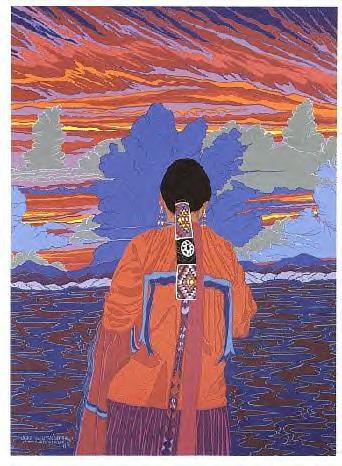|
|
Canku Ota |
|
|
(Many Paths) |
||
|
An Online Newsletter Celebrating Native America |
||
|
October 5, 2002 - Issue 71 |
||
|
|
||
|
Wisconsin Tribal Languages in Danger of Dying Out |
||
|
by Stefanie Pervos, news
writer Badger Herald
|
||
|
|
|
Monica Macaulay, a professor of linguistics, said the problem of languages dying out too quickly can be paralleled to the loss of biological diversity. In 1992, linguist Michael Krauss estimated that at least 50 percent of the world's languages are close to dying out. Compared to the estimates of endangerment of mammals, which is about 10 percent, the language situation is much worse. Macaulay said she is taking matters into her own hands by working closely with the members of the Menominee tribe, whose reservation is located at Kenesha, three hours outside of Madison. The severely endangered language has only 10 to 20 fluent speakers left, all of whom are elderly. While Macaulay said she alone cannot save the language, she is doing all she can to help. In return, she is able to do scholarly research on the language. "If most of the world's languages die, then we lose . . . most of the sources of data for our theories and analyses," she noted. Working with Macaulay on this project are two graduate students, Marianne Milligan and Christine Lemley. Milligan is writing her dissertation on the metrical structure of Menominee. Lemley is interested in the teaching of second languages and is observing and helping the teachers within the schools. The Menominee are Woodlands Indians, and their language is Algonquian. Menominee is polysynthetic, meaning it builds extremely long words with many suffixes. Macaulay said an entire sentence in English can often be expressed with one word in Menominee. Macaulay specializes in morphology, the study of the structure of words, a unique aspect of American Indian languages. Like many other tribes in similar situations, the Menominee have created a number of language preservation projects. "To the people whose languages are being lost, these are the bearers of their cultural and intellectual wealth," Macaulay said. "I don't believe that losing a language means completely losing one's culture. . . but retaining the language adds so much more. There is verbal art, cultural knowledge, medical knowledge, etc, which can be lost as the language is lost." Many programs have been designed to bring a small number of students quickly to a level of fluency with the language. These students must pass a tribally administered test and are then certified to teach in the schools on the reservation. While many members of the tribe are working hard to make everyone aware of the problem, not all Menominee are concerned with preserving their language. Macaulay and Milligan are trying to create a dictionary of the language. Currently, there is a Lexicon, but it's extremely hard to use and only goes from Menominee to English. "We plan to create a database that can be coded to produce dictionaries for varying levels--from elementary children's dictionary to an extremely detailed book for linguists and others interested in all the arcane details of word formation." Macaulay said. Professor Rand Valentine, a colleague of Macaulay, said Macaulay's work was in the spirit of the Wisconsin Idea. He said this is the notion that the boundaries of the university are not the boundaries of the campus, rather there are no limits. "I think very highly of Professor Macaulay's work, because I think it epitomizes the Wisconsin Idea, and I think she has done an excellent job of showing how the long-term professional commitment of UW faculty to the needs and interests of the people in our state can have very good results. This is the spirit of our university," Valentine said. |
|
|
||
|
|
||
| Canku Ota is a free Newsletter celebrating Native America, its traditions and accomplishments . We do not provide subscriber or visitor names to anyone. Some articles presented in Canku Ota may contain copyright material. We have received appropriate permissions for republishing any articles. Material appearing here is distributed without profit or monetary gain to those who have expressed an interest. This is in accordance with Title 17 U.S.C. section 107. | ||
|
Canku Ota is a copyright © 2000, 2001, 2002 of Vicki Lockard and Paul Barry. |
||
 |
 |
|
|
The "Canku Ota - A Newsletter Celebrating Native America" web site and its design is the |
||
|
Copyright © 1999, 2000, 2001, 2002 of Paul C. Barry. |
||
|
All Rights Reserved. |
||
 Due
to globalization and the rapid spread of English and other world languages,
tribal languages, such as the tribal language Menominee, are dying off
at an unnaturally fast rate.
Due
to globalization and the rapid spread of English and other world languages,
tribal languages, such as the tribal language Menominee, are dying off
at an unnaturally fast rate.